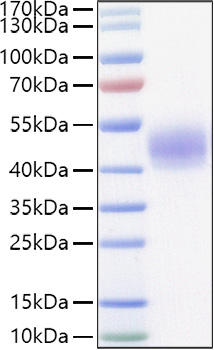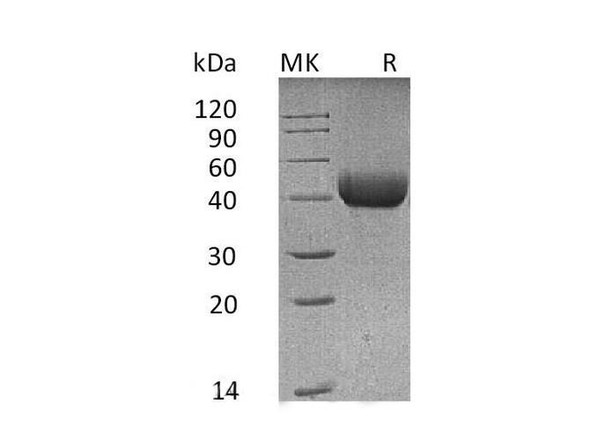Description
Recombinant Mouse Lung surfactant protein D/SFTPD Protein
The Recombinant Mouse Lung surfactant protein D/SFTPD Protein is a high-quality recombinant protein designed for murine biological research applications. This protein serves as an essential reagent in mouse model studies, comparative immunology research, and preclinical therapeutic evaluations, enabling scientists to investigate Lung surfactant protein D/SFTPD biology and its relevance to human disease mechanisms through translational research approaches.
This product (SKU: RPCB1437) is produced using HEK293 cells and features a C-His tag for convenient detection and purification. The protein exhibits a calculated molecular weight of 36.49 kDa with an observed molecular weight of 40-55 kDa under denaturing conditions, achieving ≥ 95 % as determined by SDS-PAGE., ensuring exceptional quality and consistency for research applications.
Key Features
| High Purity by Affinity Chromatography | |
| Mammalian & Bacterial Expression Systems | |
| High lot-to-lot consistency via strict QC |
| Product Name: | Recombinant Mouse Lung surfactant protein D/SFTPD Protein |
| SKU: | RPCB1437 |
| Size: | 10 μg , 20 μg , 50 μg , 100 μg |
| Reactivity: | Mouse |
| Synonyms: | SP-D, Sfpd, Sftp4, AI573415, SFTPD |
| Tag: | C-His |
| Expression Host: | HEK293 cells |
| Calculated MW: | 36.49 kDa |
| Observed MW: | 40-55 kDa |
| Gene ID: | 20390 |
| Protein Description: | High quality, high purity and low endotoxin recombinant Recombinant Mouse Lung surfactant protein D/SFTPD Protein (RPCB1437), tested reactivity in HEK293 cells and has been validated in SDS-PAGE.100% guaranteed. |
| Endotoxin: | < 0.1 EU/μg of the protein by LAL method. |
| Purity: | ≥ 95 % as determined by SDS-PAGE. |
| Formulation: | Lyophilized from a 0.22 μm filtered solution of PBS, pH 7.4. |
| Reconstitution: | Centrifuge the vial before opening. Reconstitute to a concentration of 0.1-0.5 mg/mL in sterile distilled water. Avoid vortex or vigorously pipetting the protein. For long term storage, it is recommended to add a carrier protein or stablizer (e.g. 0.1% BSA, 5% HSA, 10% FBS or 5% Trehalose), and aliquot the reconstituted protein solution to minimize free-thaw cycles. |
| Storage: | Store at -20℃.Store the lyophilized protein at -20℃ to -80 ℃ up to 1 year from the date of receipt. After reconstitution, the protein solution is stable at -20℃ for 3 months, at 2-8℃ for up to 1 week. |
Surfactant pulmonary-associated protein D, also known as SFTPD and SP-D, is a member of the collectin family of C-type lectins that is synthesized in many tissues including respiratory epithelial cells in the lung, and contains one C-type lectin domain and one collagen-like domain. The polymorphic variation in the N-terminal domain of the SP-D molecule influences oligomerization, function, and the concentration of the molecule in serum. SFTPD is produced primarily by alveolar type II cells and nonciliated bronchiolar cells in the lung and is constitutively secreted into the alveoli where it influences surfactant homeostasis, effector cell functions, and host defense. It is upregulated in a variety of inflammatory and infectious conditions including Pneumocystis pneumonia and asthma. SFTPD is humoral molecules of the innate immune system, and is considered a functional candidate in chronic periodontitis. Besides, it is involved in the development of acute and chronic inflammation of the lung. Several human lung diseases are characterized by decreased levels of bronchoalveolar SFTPD. Thus, recombinant SFTPD has been proposed as a therapeutical option for cystic fibrosis, neonatal lung disease and smoking-induced emphysema. Furthermore, SFTPD serum levels can be used as disease activity markers for interstitial lung diseases.







